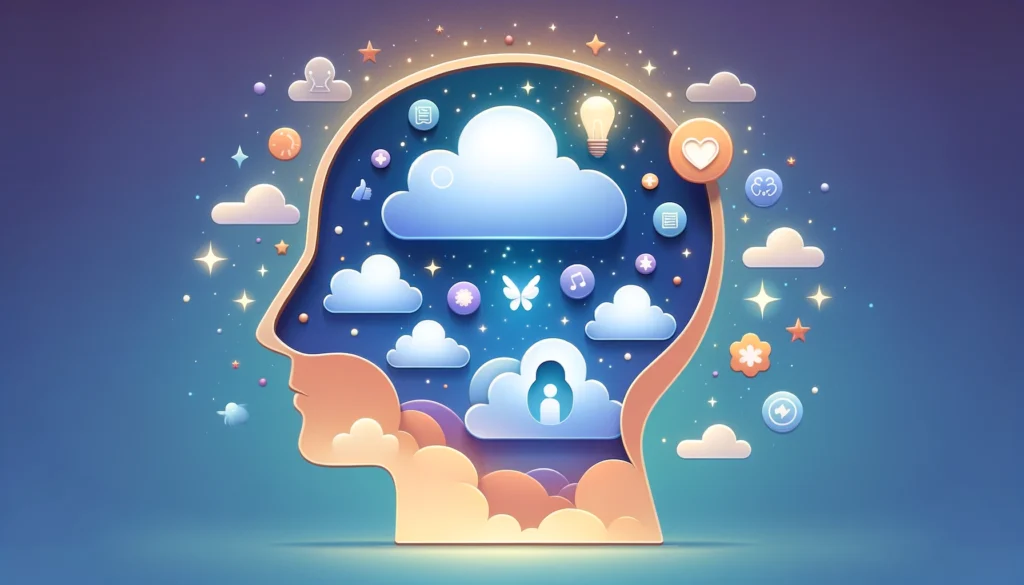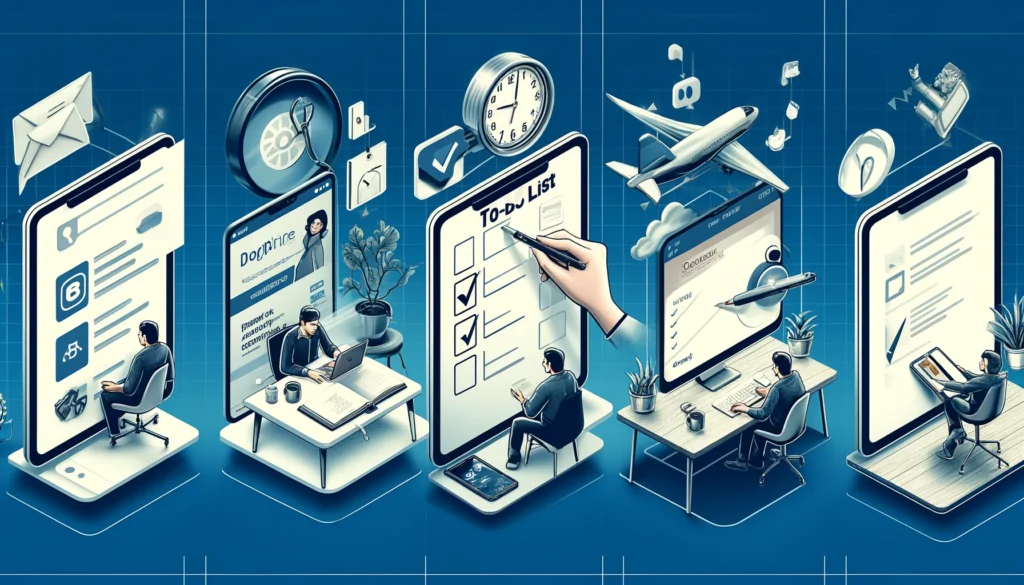In a world characterized by constant connectivity and the ubiquitous presence of digital devices, mental health apps have emerged as invaluable tools for safeguarding and enhancing our emotional and psychological well-being. These apps, accessible right from our smartphones, offer a range of services that help manage stress, anxiety, depression, and improve overall mental wellness. In this comprehensive article, we’ll delve deeper into the world of mental health apps, their functions, and how they are empowering individuals to take control of their mental health in the digital age.
The Digital Age’s Impact on Mental Health
The digital age has brought many conveniences, but it has also introduced unique stressors and challenges that affect our mental health. The constant stream of information, the pressures of social media, and the demands of work and personal life can all take a toll on our well-being. As we become increasingly reliant on technology, we also face issues such as digital overload, cyberbullying, and the erosion of work-life boundaries, all of which contribute to stress, anxiety, and other mental health issues.
The Rise of Mental Health Apps
Mental health apps have emerged as a response to these modern challenges. By leveraging technology, these apps offer accessible and effective solutions to support mental well-being. They provide a variety of tools and resources that help users manage their mental health on their own terms, anytime and anywhere.
What Are Mental Health Apps?
Mental health apps are mobile applications designed to support and improve mental well-being. These apps offer a wide range of features and services, from meditation and mindfulness exercises to mood tracking and therapy sessions. They can be used independently or in conjunction with traditional therapy, providing users with tools to better manage their mental health.Types of Mental Health AppsThere are several types of mental health apps, each catering to different aspects of mental wellness:
- Meditation and Mindfulness Apps: These apps guide users through relaxation exercises, breathing techniques, and meditation sessions to reduce stress and anxiety.Mood Tracking Apps: These apps allow users to monitor their mood and emotional well-being over time, helping them identify patterns and triggers.Cognitive Behavioral Therapy (CBT) Apps: These apps offer CBT exercises and resources, a widely recognized and effective therapeutic approach for managing depression, anxiety, and other conditions.Therapy and Counseling Apps: These apps facilitate communication with licensed therapists through secure messaging or video sessions, making therapy more accessible and convenient.Community and Support Apps: These apps provide social features, such as peer support groups or access to mental health professionals, fostering a sense of community and assistance when needed.Stress and Anxiety Management Apps: These apps offer tools and techniques specifically designed to help users manage stress and anxiety.
Mental health apps utilize various features and technologies to support users in managing their mental health. Here’s a closer look at some common functionalities:
- Assessment and Monitoring
Many mental health apps start by assessing the user’s mental health through questionnaires and self-assessment tools. These assessments help the app understand the user’s current state of mental health and tailor the experience accordingly. Once the initial assessment is complete, users can continue to track their mood and emotional well-being over time. This ongoing monitoring helps users identify patterns and triggers, providing valuable insights into their mental health.
- Meditation and Mindfulness
Meditation and mindfulness apps guide users through relaxation exercises, breathing techniques, and meditation sessions. These practices are designed to reduce stress, increase mindfulness, and improve overall mental well-being. Many apps offer guided sessions for beginners, as well as more advanced practices for experienced users. By incorporating regular meditation and mindfulness practices into their routine, users can cultivate a sense of calm and balance.
- Cognitive Behavioral Therapy (CBT)
Cognitive Behavioral Therapy is a widely recognized and effective therapeutic approach for managing conditions such as depression and anxiety. Some mental health apps offer CBT exercises and resources that users can engage with at their own pace. These exercises typically involve identifying negative thought patterns, challenging irrational beliefs, and developing healthier coping strategies. By working through these exercises, users can gain greater control over their thoughts and emotions.
- Community and Support
Many mental health apps have social features that allow users to connect with others for support and encouragement. This can include peer support groups, where users can share their experiences and offer advice to one another, or access to mental health professionals who can provide guidance and support. Having a sense of community and knowing that others are facing similar challenges can be incredibly comforting and empowering.
- Progress Tracking
Mental health apps often include features that allow users to monitor their progress over time. This can include tracking mood changes, noting improvements in symptoms, and setting goals for personal growth. By keeping track of their progress, users can stay motivated and see the positive impact of their efforts on their mental health.
- Therapist Communication
Some mental health apps facilitate communication with licensed therapists through secure messaging or video sessions. This makes therapy more accessible and convenient, especially for those who may have difficulty attending in-person sessions. Users can discuss their concerns with a therapist, receive professional advice, and work on therapeutic exercises together. This hybrid approach combines the benefits of traditional therapy with the flexibility of digital tools.
Benefits of Mental Health Apps
Mental health apps offer numerous benefits for individuals seeking to prioritize their well-being. Here are some key advantages:
- Accessibility
Mental health apps are available 24/7, providing immediate access to resources and support whenever they are needed. This is particularly beneficial during times of crisis or when traditional mental health services may not be readily available. Users can access tools and exercises on their smartphones, making it easy to integrate mental health practices into their daily lives.
- Affordability
Many mental health apps offer free or affordable options, making mental health care more accessible than traditional in-person therapy. While some apps may charge a subscription fee for premium features, the overall cost is often lower than the expense of regular therapy sessions. This makes mental health support more attainable for a broader audience.
- Privacy and Confidentiality
Users can engage with mental health apps in the privacy of their own space, reducing the stigma often associated with seeking mental health support. This can be especially important for individuals who may feel uncomfortable discussing their mental health concerns with others. Apps typically ensure that all data and interactions are kept confidential, providing a safe and secure environment for users.
- Personalization
Mental health apps can tailor content and exercises to an individual’s specific needs, ensuring a personalized approach to mental wellness. By using assessment tools and tracking progress, apps can offer customized recommendations and exercises that align with the user’s unique mental health goals. This personalized approach enhances the effectiveness of the app and helps users achieve better outcomes.
- Preventive Care
Mental health apps can help individuals build resilience and develop healthy coping strategies, potentially preventing the onset of more serious mental health conditions. By incorporating regular mental health practices into their routine, users can maintain a positive mindset and proactively address any emerging issues. This preventive approach promotes long-term mental well-being and reduces the risk of crises.
The Interconnectedness of Mental Health and Productivity
In the quest for optimal performance and success, it’s essential to recognize the interconnectedness of mental health and productivity. While productivity apps are often celebrated for their ability to streamline tasks and maximize efficiency, integrating mental health apps into our routines is equally vital for maintaining balance and sustained performance. When our mental health is compromised, our ability to focus, make decisions, and perform effectively can suffer. By prioritizing mental wellness, we can enhance our productivity and achieve a healthier, more balanced lifestyle.
Popular Mental Health Apps
A wide variety of mental health apps are available, catering to different needs and preferences. Here are a few popular ones:
Headspace
Platform: iOS, AndroidOverview: Headspace is renowned for its guided meditation and mindfulness exercises, designed to help users reduce stress, increase focus, and improve overall mental health.Features:
- Guided Meditations: Offers a variety of guided meditations for stress relief, focus, and sleep improvement.Mindfulness Exercises: Daily mindfulness exercises and tips to help integrate mindfulness into everyday life.Sleep Stories: A selection of relaxing sleep stories to help users unwind and fall asleep.Progress Tracking: Track your meditation progress and set reminders to stay consistent with your practice.
Pros:
- User-friendly interfaceHigh-quality contentVariety of meditation topics
Cons:
- Requires a subscription for full accessMay feel repetitive over time
Calm
Platform: iOS, AndroidOverview: Calm provides a wide range of meditation sessions, sleep stories, and relaxation techniques aimed at promoting emotional well-being and reducing stress.Features:
- Meditation Sessions: Guided sessions for beginners to advanced users, covering various topics such as stress, focus, and gratitude.Sleep Stories: Narrated stories designed to help users relax and fall asleep.Breathing Exercises: Techniques to help manage stress and anxiety.Daily Calm: A new 10-minute program each day to start your morning or unwind before bed.
Pros:
- Extensive library of meditations and sleep storiesHigh-quality audio productionRegularly updated content
Cons:
- Subscription required for full accessSome features may be too basic for advanced meditators
Talkspace
Platform: iOS, Android, WebOverview: Talkspace connects users with licensed therapists for online therapy sessions through secure messaging or video calls, making therapy more accessible and convenient.Features:
- Therapist Matching: Matches users with licensed therapists based on their preferences and needs.Secure Messaging: Communicate with your therapist via text, audio, or video messages.Flexible Scheduling: Schedule live video sessions at your convenience.Comprehensive Support: Access to a wide range of therapists specializing in different areas of mental health.
Pros:
- Convenient and accessible therapyFlexible communication optionsProfessional and licensed therapists
Cons:
- Cost can be high without insurance coverageMay lack the personal touch of in-person therapy
Moodpath
Platform: iOS, AndroidOverview: Moodpath provides mood tracking, self-assessment, and CBT exercises to help users manage their mental health and gain insights into their emotional well-being.Features:
- Mood Tracking: Daily prompts to track your mood and identify patterns over time.Self-Assessment: Regular check-ins to assess symptoms and emotional health.CBT Exercises: Evidence-based exercises to manage anxiety and depression.Reports: Generate detailed reports to share with healthcare providers.
Pros:
- Comprehensive mood trackingPersonalized insights and feedbackUser-friendly interface
Cons:
- Limited free featuresMay require additional resources for severe cases
7 Cups
Platform: iOS, Android, WebOverview: 7 Cups offers emotional support by connecting users with trained listeners or licensed therapists, fostering a sense of community and care.Features:
- Peer Support: Chat with trained listeners who provide empathetic support.Therapy Sessions: Access licensed therapists for professional counseling.Self-Help Guides: A library of resources and exercises to support mental health.Community Forums: Join discussions with others facing similar challenges.
Pros:
- Free peer supportAccessible therapy optionsActive community and forums
Cons:
- Quality of peer support can varyTherapy sessions require payment
Happify
Platform: iOS, Android, WebOverview: Happify uses science-based activities and games to help users reduce stress, build resilience, and improve overall happiness.Features:
- Activities and Games: Engaging activities and games designed to boost mood and reduce stress.Personalized Tracks: Tailored programs based on individual needs and goals.Progress Tracking: Monitor your progress and see how your happiness improves over time.Insights and Feedback: Receive insights and feedback to stay motivated.
Pros:
- Fun and engaging formatScience-based approachPersonalized experience
Cons:
- Requires a subscription for full accessMay not be suitable for severe mental health issues
Sanvello
Platform: iOS, Android, WebOverview: Sanvello offers on-demand help for stress, anxiety, and depression through self-care, peer support, coaching, and therapy.Features:
- Self-Care Tools: Guided journeys, tools, and daily mood tracking.Peer Support: Community forums and group support.Coaching: Access to professional coaches for guidance and support.Therapy: Options to connect with licensed therapists for ongoing therapy.
Pros:
- Comprehensive support systemIntegrates self-care with professional supportFlexible options for different levels of care
Cons:
- Subscription required for full accessCoaching and therapy may incur additional costs
Woebot
Platform: iOS, AndroidOverview: Woebot is an AI-powered chatbot that provides emotional support and mental health guidance through conversational interactions.Features:
- Chatbot Support: 24/7 conversations with an AI-powered chatbot.Evidence-Based Techniques: Uses CBT techniques and other therapeutic approaches.Personalized Experience: Tailored conversations based on user input.Progress Tracking: Monitor mood and track progress over time.
Pros:
- Always available for supportEngaging and interactive formatFree to use
Cons:
- Limited to chatbot interactionsNot a replacement for professional therapy
As technology continues to advance, mental health apps are likely to become even more sophisticated and effective. Here are some trends and innovations we can expect in the future:
- Integration with Wearables
Future mental health apps may integrate with wearable devices, such as smartwatches and fitness trackers, to provide real-time monitoring of physiological indicators related to mental health. This could include tracking heart rate variability, sleep patterns, and physical activity levels, allowing for a more comprehensive understanding of an individual’s mental well-being.
- Artificial Intelligence (AI) and Machine Learning
AI and machine learning will play a significant role in the evolution of mental health apps. These technologies can analyze user data to provide more personalized and accurate recommendations. AI-powered chatbots and virtual therapists will become more advanced, offering conversational support that feels more human-like and empathetic.
- Virtual Reality (VR) and Augmented Reality (AR)
VR and AR technologies have the potential to revolutionize mental health apps by creating immersive therapeutic experiences. VR can be used for exposure therapy, helping individuals confront and overcome fears in a controlled environment. AR can provide real-time stress management techniques and mindfulness exercises that blend seamlessly with the user’s surroundings.
- Enhanced Data Security and Privacy
As mental health apps continue to collect sensitive user data, ensuring robust data security and privacy will be paramount. Future apps will implement advanced encryption methods and adhere to strict data protection regulations to safeguard user information and build trust.
- Holistic Health Integration
Mental health apps will increasingly integrate with other health and wellness platforms to offer a holistic approach to well-being. This integration will allow users to manage their physical and mental health in tandem, promoting overall wellness and balance. Apps may provide personalized nutrition advice, exercise recommendations, and stress management techniques based on comprehensive health data.
The Digital Age of Mental Wellness
Mental health apps are helping to reshape the way we approach mental wellness. They empower individuals to take an active role in managing their mental health and seeking support when needed. As technology continues to advance, we can expect these apps to become even more sophisticated, offering new tools and resources to support mental well-being. In a digital age that often brings challenges to our mental health, these apps serve as valuable allies in our journey toward emotional and psychological wellness.
Conclusion
In today’s fast-paced and digitally connected world, mental health apps have become essential tools for maintaining and improving our mental well-being. By providing accessible, affordable, and personalized support, these apps empower us to take control of our mental health and lead healthier, more balanced lives. Whether you’re seeking to reduce stress, manage anxiety, or simply improve your overall mental wellness, there’s likely a mental health app that can help you achieve your goals. So, explore these apps, find the ones that resonate with you, and take the first step towards a healthier mind and a happier life.


